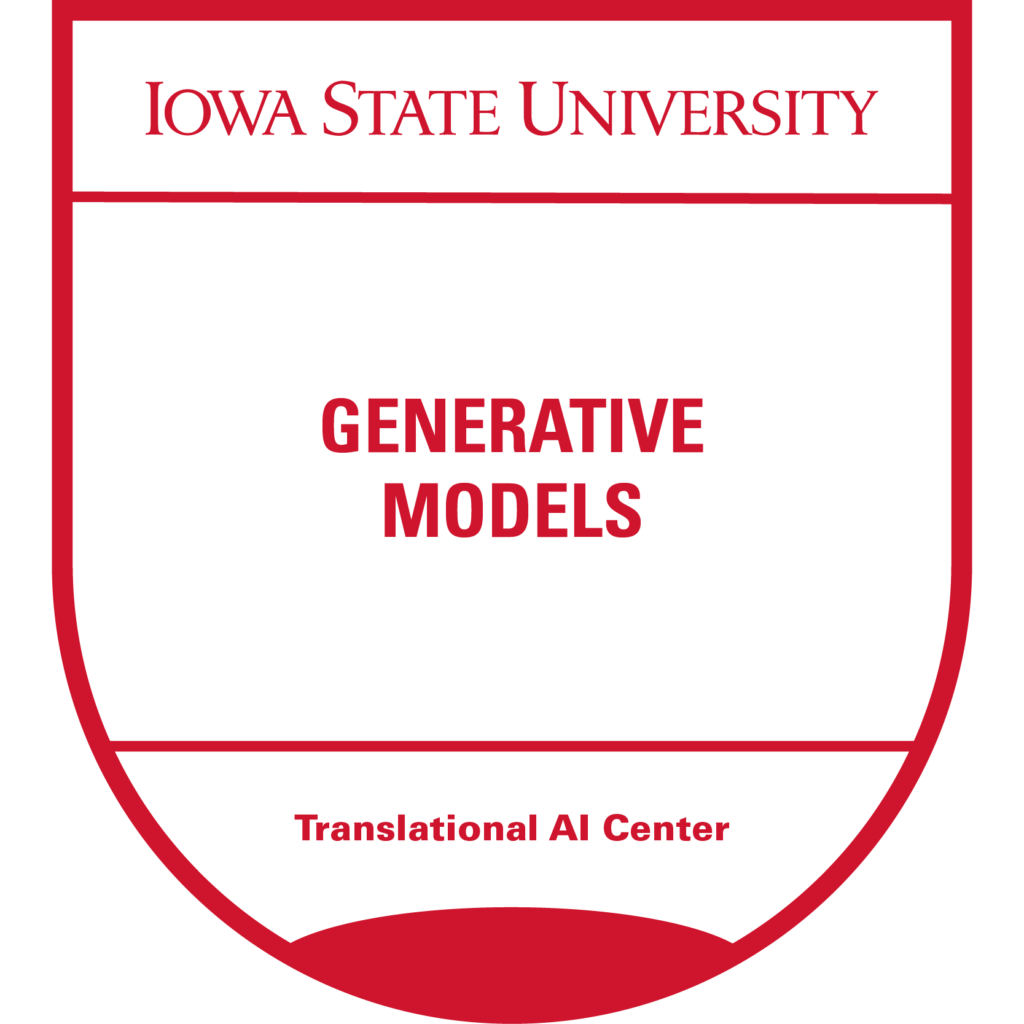Generative Models

Registration Reopens in Fall 2025
Master Generative Models: Your Path to AI Excellence
Course Description
Elevate your machine learning skills with our comprehensive course, “Generative Models”. This course covers everything you need to know about generative models, from the basics of discriminative vs. generative models to advanced techniques like variational autoencoders, generative adversarial networks, and diffusion models.
Engage in hands-on activities, solve real-world problems in image and time-series generation, and receive expert guidance from our instructors. By the end of this course, you’ll have the knowledge and confidence to tackle any machine-learning challenge using generative models. Join us and become a leader in the AI field!
This course is one of 6 courses in the Foundations in AI pilot Micro-Credential pathway offered by the Translational AI Center at Iowa State University.
Complete any 3 courses listed below to earn the Foundations in AI badge:
- Machine Learning Operations (MLOps)
- End-to-End Computer Vision
- Generative Models
- Mastering PyTorch
- End-to-End Natural Language Processing
- Interpretability in AI
Learn more about Micro-Credentials at Iowa State University!
Prerequisites
- Basic Python programming
- Basic understanding of deep learning models
- Basic understanding of generative AI
- Basic PyTorch programming
Intended Audience
The course is intended for a broad audience within the spectrum of the software and technology industry, including software engineers, data scientists, data engineers, data analysts, research scientists, and software developers. The course is designed to provide a basic understanding of AI and how to use PyTorch for a broad range of audiences.
Learning Outcomes
Assessments
Course Outline
By the end of the course, you should be able to:
- Formulate a generative AI problem based on a given data set and select the most appropriate generative models to solve a specific task
- Develop basic variational Autoencoder model to complete the input data reconstruction and new data generation tasks
- Develop basic generative adversarial network model to address specific tasks in a given problem statement
- Design advanced generative models with diffusion models to generate new perceptual data such as images and sound
- 1 Quiz to learn basic knowledge of discriminative and generative models.
- 3 Coding exercise questions which would include implementing Python codes based on hands-on activities. This would include coding a variational Autoencoder, a generative adversarial network and a diffusion model, and hyperparameter tuning for model optimization.
- Module 1: Introduction to generative models and their applications
- Module 2: Design and develop variational Autoencoder
- Module 3: Develop generative adversarial networks
- Module 4: Develop diffusion models
Course Procedures
The course starts on November 4, 2024. All coursework must be completed by December 31, 2024, in order to earn the micro-credential badge. You will continue to have access to the course materials until August 31, 2025. The approximate time to complete this course is 16 hours.
This course has an instructional period from November 4 to December 6, 2024. During this instructional period, course materials will be released weekly and live synchronous sessions will be held. You may complete the course materials at your own pace. Live Zoom meetings will be conducted for interactive coding sessions. A suitable time for these live sessions will be determined through a group poll. The recordings of those sessions will be available soon after each meeting.
You will receive the Generative Models micro-credential badge upon successful completion of the course assessments.
Course Materials
Course materials are provided within the course. No additional purchase is required.
Contact Information
Contact isopd@iastate.edu for more information.
Course Developer
The Translational AI Center breaks down disciplinary silos to bring together core Iowa State artificial intelligence researchers and subject matter experts interested in applying new technologies to their work. For more information, visit Translational AI Center at Iowa State University

Registration Cost: $750.00 $500.00 USD (Initial Promo)
*$300.00 Student & Government Employee
Course Hours: 16 hours
Course Start Date: November 4, 2024
Last Day to Register: November 8, 2024
Instructional Period: November 4-Dec 6, 2024
Last Day to Earn a Micro-Credential Badge: December 31, 2024
Time to Complete Badge: 57 Days
*At the time of registration, you’ll be asked to create an account for this course. Use an email address ending in “.edu” or “.gov” to receive a discount. $200.00 will be immediately credit back after purchase.
Instructor
 Zhanhong Jiang, Data Scientist
Zhanhong Jiang, Data Scientist
